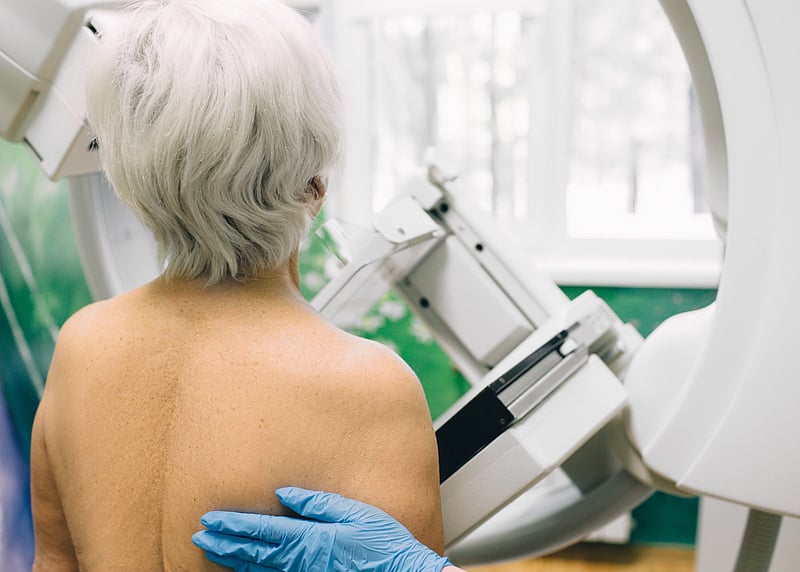Get Healthy!

- Denise Mann
- Posted August 8, 2023
Breast Cancer Screening May Not Be Worth It for Women Over 70
The risks of screening mammograms to catch breast cancer may outweigh the benefits for certain women aged 70 or older, new research indicates.
The main risk? Overdiagnosis and treatment of a breast cancer that likely wouldn't have caused any symptoms during a woman's lifetime.
"For women who are on the younger end of the age range and who are generally healthy, the risk of overdiagnosis from screening may be acceptably low,"said study author Dr. Ilana Richman, a general internist and health services researcher at Yale Cancer Center in New Haven, Conn. "For older women and those with other serious medical conditions, the risks of overdiagnosis are higher and may outweigh the benefits of screening."
The American Cancer Society recommends that women aged 55 and older undergo mammograms every two years or continue annual screening, and it states that such screening should continue as long as a woman is in good health and expected to live for 10 or more years.
The study, which included close to 55,000 women aged 70 years and older who had been recently screened for breast cancer, found that the risk of overdiagnosis increased with age. Specifically, about 31% of breast cancers picked up among women aged 70 to 74 were considered overdiagnosed. In women aged 74 to 84, up to 47% of breast cancers were overdiagnosed. The risk of overdiagnosis was highest in women aged 85 and older, the study showed.
"Women who are diagnosed with breast cancer typically undergo treatments including surgery, and possibly radiation, chemotherapy and long-term medications,"Richman said. "What this means is that some women end up getting these relatively intensive treatments for a breast cancer that never would have caused symptoms."
The findings were published Aug. 8 in the Annals of Internal Medicine.
The value of early detection with a mammogram is improved quality of life and reduced risk of dying from breast cancer, said Dr. Marisa Weiss, chief medical officer and founder of Breastcancer.org.
"For women aged 70 and older who are expected to live another 5 to 10 years, and without other significant active [diseases or conditions], mammography remains important,"said Weiss. "It can improve their quality of life by finding a cancer before it grows and spreads, potentially causing symptoms such as pain, bleeding and malodorous fluid discharge in the breast area or other parts of the body."
Women who've lived to age 70 and older and are in relatively good health are more likely to live a lot longer, she noted. "They know that there are risks with each procedure, and are often willing to take the risk of overdiagnosis to avoid the risk of underdiagnosis," Weiss said.
That's exactly how Susan Salenger, 80, sees it. The Petaluma, Calif.-based author of Sidelined: How Women Can Navigate a Broken Healthcare System, gets her screening mammogram every year -- without fail. "I am hoping that if I do get breast cancer, I catch it early,"she said. "Not only am I too anxious to skip a mammogram, I am also proactive about my health and would want all the information and to participate in any treatment decisions."
This approach makes sense, Weiss added. "While our tools are improving rapidly, we still are without the crystal ball that can differentiate lethal cancer from one that is indolent and is unlikely to ruin your quality of life and/or kill you during your natural lifespan,"she said.
Dr. Otis Brawley co-wrote an editorial accompanying the new study. He is a professor of oncology at the Johns Hopkins University School of Medicine in Baltimore.
"There are cancers that are not a threat to the patient,"Brawley said. "We need to incorporate the development of tests that objectively and accurately determine the cancers that need treatment from the ones that do not."
His advice? "If a woman fears cancer, she should get screened, in my mind, but realize she may get overtreatment especially if diagnosed with ductal carcinoma in situ [DCIS],"he said. DCIS is considered a noninvasive breast cancer.
Dr. Catherine Sarkisian, a geriatrician at the David Geffen School of Medicine at the University of California, Los Angeles, has these important talks with women often.
"Before deciding on whether or not to have a mammogram, older women should have personalized conversations with their physicians about the risks and benefits of screening that take into account their life expectancy, personal values around risk aversion, and how they value their time away from the medical system,"said Sarkisian.
More information
Breastcancer.org has more on screening for breast cancer.
SOURCES: Ilana Richman, MD, general internist, health services researcher, Yale Cancer Center, and assistant professor, medicine (general medicine), Yale School of Medicine, New Haven, Conn.; Marisa Weiss, MD, chief medical officer and founder, Breastcancer.org, Ardmore, Pa.; Susan Salenger, author, Petaluma, Calif.; Otis Brawley, MD, professor, oncology, Johns Hopkins University School of Medicine, Baltimore; Catherine Sarkisian, MD, MSHS, geriatrician, David Geffen School of Medicine, University of California, Los Angeles; Annals of Internal Medicine, Aug. 8, 2023

